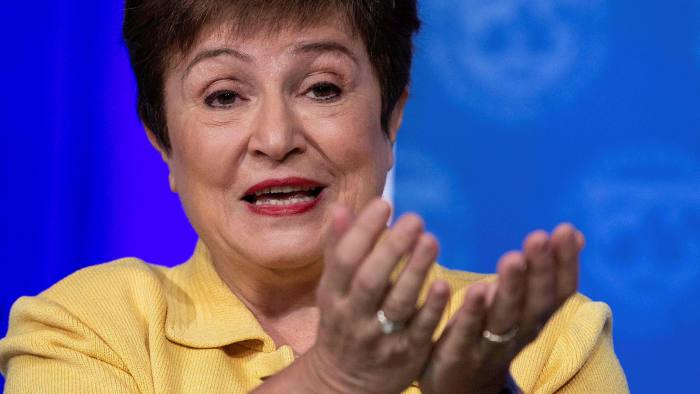
Date: August 03, 2021
News Author(s): Jonathan Wheatley, Colby Smith
Photo Credit: Reuters
Source: Financial Times
IMF allocates $650bn to boost pandemic-hit economies
The IMF has agreed to boost the finances of low and middle-income countries to support their pandemic response through a $650bn allocation of its special drawing rights.
The allocation, which is a form of foreign reserve asset, is the equivalent of newly minted money that will be given to the fund’s 190 member countries roughly in proportion to their share of the global economy. About $275bn of the allocation will go to emerging and developing countries, with the rest earmarked for the world’s biggest economies.
“This is a historic decision — the largest SDR allocation in the history of the IMF and a shot in the arm for the global economy at a time of unprecedented crisis,” said Kristalina Georgieva, IMF managing director, in a statement on Monday.
“The SDR allocation will benefit all members, address the long-term global need for reserves, build confidence, and foster the resilience and stability of the global economy. It will particularly help our most vulnerable countries struggling to cope with the impact of the Covid-19 crisis.”
The announcement came at a critical juncture for developing economies. Many countries’ recoveries are faltering as they endure rising Covid-19 case counts and death tolls with the spread of the more contagious Delta variant. Citing limited access to vaccines as a significant headwind, the IMF recently slashed its 2021 growth forecast for emerging and developing economies by 0.4 percentage points to 6.3 per cent.
SDRs are provided without the conditionality usually attached to IMF lending and do not have to be repaid, leaving governments free to use them as they wish without taking compensatory measures to shore up public finances.
In her proposal for the allocation last month, Georgieva noted that more than half of all emerging and developing countries had entered the pandemic with inadequate finances and many had been forced to deplete their reserves to respond to the crisis.
Access to global capital flows had been eased by the trillions of dollars injected into financial systems by advanced economies’ central banks, but this could no longer be counted on as policymakers consider pulling back support, she said.
Many observers have called on rich countries to donate their SDRs to poor countries in greater need. On Monday, Georgieva indicated the IMF would seek to advance those efforts.
“We will also continue to engage actively with our membership to identify viable options for voluntary channelling of SDRs from wealthier to poorer and more vulnerable member countries to support their pandemic recovery and achieve resilient and sustainable growth,” she said.
Some countries including Japan, France, the UK and Italy have lent SDRs to the IMF’s Poverty Reduction and Growth Trust, which has provided emergency funding to several poor countries during the pandemic. However, most of the PRGT’s funding comes with conditions attached and must be repaid, making it less advantageous for recipients.
The IMF’s member countries voted to support the allocation after it was approved by the organisation’s executive board in early July. The US, which has enough votes because of the size of its economy to wield a unilateral veto, blocked the allocation under former president Donald Trump when it was first proposed in 2019, but Joe Biden’s administration was quick to signal its support when he took office in January.
The allocation is due to be made on August 23.
Keywords: sterlinghousetrust.com, Sterling House Trust, SHT
Sterling House Trust is a private trust with a difference. It offers its members an exclusive and reliable platform to access unique opportunities and lifestyle services reserved for the select few. With its team of professional managers Sterling House Trust constantly scans the markets and collaborate with reliable global partners to create a portfolio of carefully curated programmes for its members. Members can access these programmes according to their individual needs, interest and financial capacity. Sterling House Trust is headquartered in Auckland, New Zealand, and has operations based in London, UK.
The Sterling House Trust platform was established with the objective of providing its members, secure access to opportunities across a range of global locations, sectors and services.

Our unique Platform was established within the framework of a trust so that the trust would have oversight and governance over the range of services and its quality. Member protection is a core principle and drive in all that we do. Our trustees ensures that the interests and quality of service provided by the Platform are always maintained at the highest standards.
The trust and its trustees provide robust oversight and is constantly on the move to identify and shortlist select opportunities in the international markets. Likewise, we apply the same stringent standards in identifying and selecting providers and professional partners to join our Platform.
The Sterling House Trust Platform utilises our international footfall and relationships to provide our members with access to a range of international opportunities via our global network which covers a broad range of sectors including:
Asset protection, international property ownership and management, alternative and direct ownership, estate planning, banking services, foreign exchange, card services, alternative investment and lifestyle services.

New Zealand Head Office
31/335 Lincoln Road,
Addington
Christchurch
New Zealand
London Office
14-16 Dowgate Hill,
London,
England EC4R 2SU